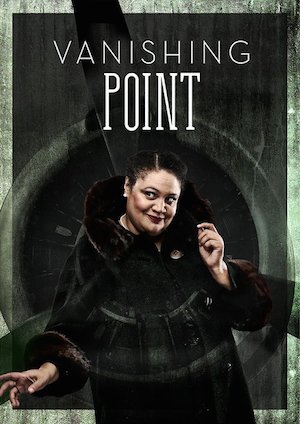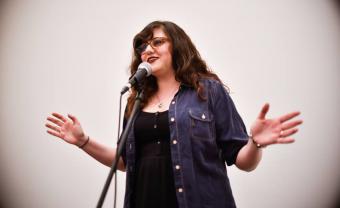Award-winning playwright Liv Cummins, an associate professor of drama and creative writing at Lesley, is co-creator of the musical, Vanishing Point, which recently finished a successful run at Seattle Public Theater.
The musical brings together three famous women as they solve the mystery of their disappearances: Aviatrix Amelia Earhart, who vanished completely; evangelist Aimee Semple McPherson, who disappeared for three weeks; and author Agatha Christie, who went missing for 11 days.
We caught up with Professor Cummins and asked her about how she and her collaborators crafted the musical and what advice she gleaned from the process.
Q: How did you assemble your creative team?
Scott Keys and Rob Hartmann were in the same class at our grad program, NYU’s Tisch School of the Arts Graduate Musical Theater Writing Program. They wrote a one-act version of the piece, and had a production of it in that early iteration. In the meantime, Rob and I started working on another piece, and enjoyed working together. Rob and Scott, not happy with the way Vanishing Point was coming together, stopped working on it. But Rob never stopped believing in it, and asked me to come on board as the third collaborator to write book and lyrics with him.
Q: How did you come up with such a story line?
Scott had the idea when he read a book about women who have vanished and the stories surrounding their disappearances. He was intrigued by many of the similarities between Aimee, Agatha, and Amelia—one of which being that they were all ‘A’ names. Being a lyricist, that appealed to him. And then, of course, he delved deeper and found many more connections among the three.
Q: How did the story line turn into a musical?
We figured out the story we wanted to tell about these three women and how their stories linked. We looked for the song moments—those moments when the characters have to sing—and there were so many. The material lends itself nicely to a musical, especially since they all have big personalities.
Q: What makes this musical unique?
When I came aboard, the piece only had the three women playing themselves, and interacting with one another, sharing each other’s stories. However, I thought the piece could be much more theatrical and active. I had the idea that each actress playing a main character would also play each other’s mothers, lovers, reporters, family members, and other minor characters—literally playing out each other’s stories for each other and for the audience, changing hats constantly. The result is that the actresses are constantly moving and interacting with each other onstage as different characters, raising the tension and conflict inherently as they barely have time to catch their breath as the story leads to the moment when they all vanish. It’s exciting.
Q: How did you progress from one-act play to a full musical?
We came up with a new outline for the show based on the new idea for the multiple characters. The "book" of a musical is the story: what happens, how the story progresses from scene to scene, and the dialogue—the lines characters speak. It’s the "play" of the show, if you will. Lyrics are the words of the songs that are sung. Rob and I worked closely on both the book and lyrics. When we’d find a song moment in the show, we’d sit together and write out the lyrics together, talking through every line and beat of the song, after which Rob would write the music.
Q: What’s your advice for successful collaboration?
Rob wrote the music, although we always worked on things together, so I would talk to him about how the music fit the lyric or whether it seemed we should change something. We have a very open collaboration so we can talk through anything without ego: it’s always about what’s best for the show.
The staging is determined by the director, who is different in every production. If we’re a part of the production or have been invited to rehearsals by the director, which has happened especially early on in the process, we can talk to the director about what we’re seeing in the staging and whether things might want to go in another direction. But, ultimately, the director and cast must make these decisions on their own.
Q: Did you hold readings or workshops as it took shape?
After I came aboard, we had several workshops and readings, in New York and elsewhere. We worked with directors and producers who believed in it and helped us shape it, which is vital for new musicals to form.


